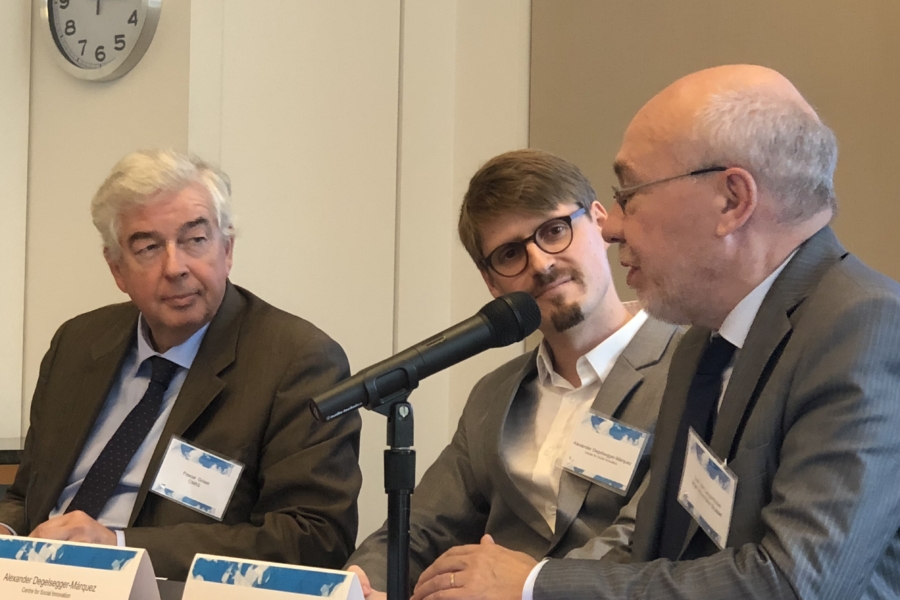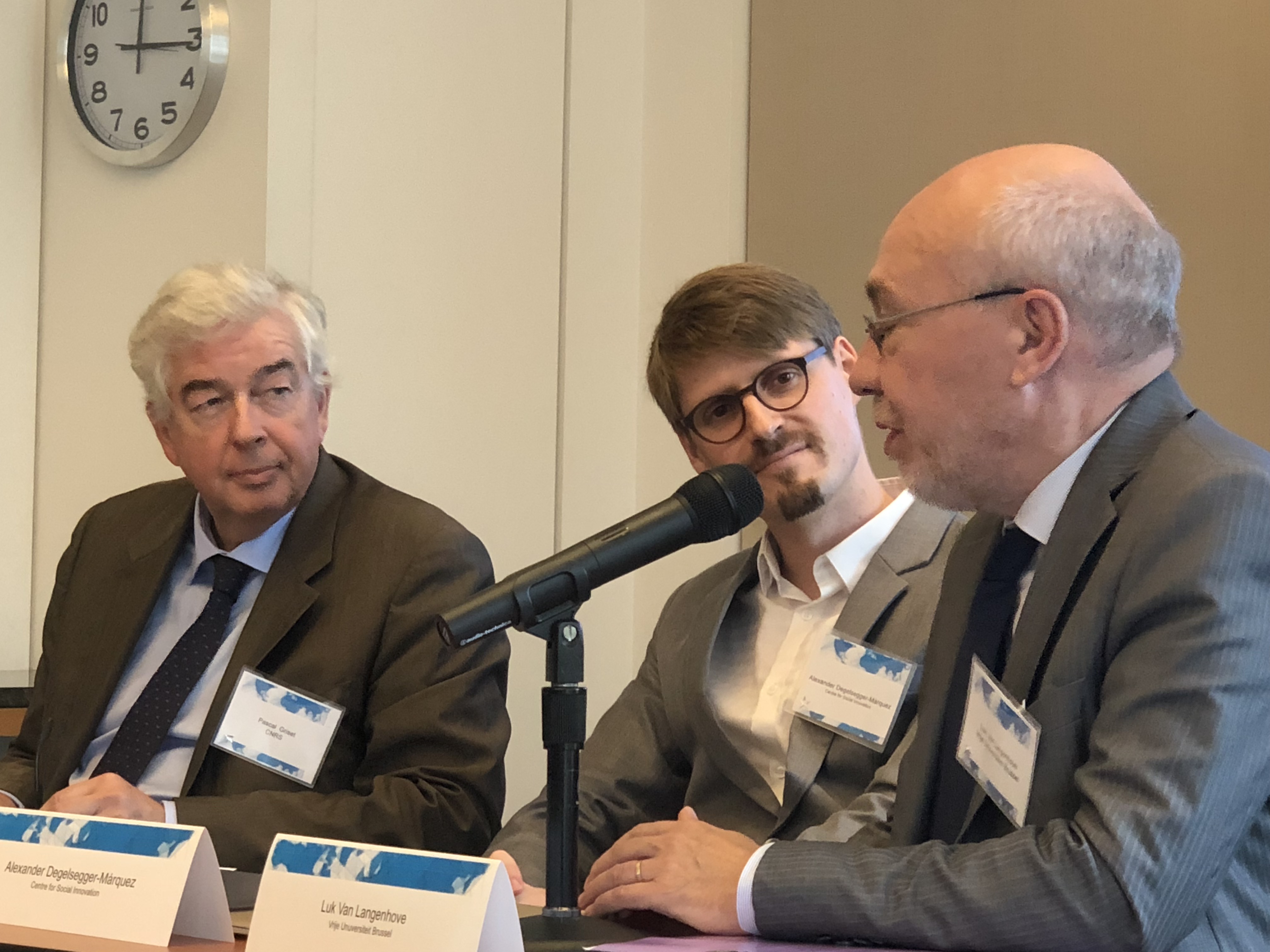The ‘State of Play’ of Science Diplomacy in Europe

On 14 September 2018, three H2020 projects took the stage in Washington D.C. to inform a North American and international audience about the ’state of play' of science diplomacy in Europe.

The European Commission-funded science diplomacy projects InsSciDE, S4D4C and EL-CSID came together in a panel session for the American Association for the Advancement of Science (AAAS) “Science Diplomacy 2018” conference celebrating the 10th anniversary of the AAAS Center for Science Diplomacy. Held annually since 2014, the meeting provides a space for scholars, academics, policymakers and diplomats to gather to discuss emerging and pertinent issues in science diplomacy. This year’s conference addressed topics such as the role of local and global diplomacy, diplomatic science, technology and innovation in peace, security and power. Speakers included eminent scientists such as the Nobel Prize Laureate Barry Barish, as well as AAAS leaders, and government science advisors and policymakers.
The panel session titled ‘A new horizon in EU science diplomacy’ showcased the three H2020 projects which examine the interplay of national and EU-level practices and institutions in science diplomacy, providing insights not only at the European, but also the global level, looking at the balance between national and supranational interests in addressing the common good. The session was coordinated by Casimiro Vizzini (UNESCO) and moderated by Marga Gual Soler (AAAS).
Prof. Luk Van Langenhove (IES), the scientific coordinator of EL-CSID, emphasised the moral obligation to engage in cohesive efforts to build a cogent science diplomacy policy, especially in the scattered science diplomacy landscape that currently exists in Europe. According to him, there is not only a need to change the nature of multilateralism of the governance structure but also to increase the input of the scientific and technological community to deal with the diverse global issues. He believed this would be a prominent agenda in the coming years. He recommended better cross-border engagement, which should include open science and technology cooperation and free access to knowledge. He proposed that scholars studying science diplomacy should aim to provide an array of case studies on successes and failures of science diplomacy, practitioners of science diplomacy to share best practices to improve performance and replicate successes, scientists to create awareness-generating activities and policymakers to integrate science to their agenda. Additionally, he advocated building a science diplomacy element in Horizon Europe and setting up a European observatory for science diplomacy that acts as a knowledge-sharing platform.
The presentation by InsSciDE project coordinator Prof. Pascal Griset (CNRS) highlighted the contrasting trajectories of German and French scientific diplomacy since the 1960s. Several differences appear in the context of such a comparison. The French network was set up earlier and increased more significantly between the 1970s and 1980s. The German network appears as a more progressive construction from the end of the 1960s to the present. If the two states take full account of science as an asset for their diplomacy, they do so with staggered temporalities and according to different modes of organization. For example, France has linked science diplomacy and cultural diplomacy more strongly than Germany since the 1990s. To explain the origins of these differences, Pascal Griset proposed to analyse structural elements. He thus evoked the different status of the two countries in late 20th century geostrategic balances as well as the existence of different administrative and political cultures. Nonetheless, points of convergence and recent joint initiatives suggest that French and German science diplomacy, transcending national particularities while taking fully into account the legacies of the past, can be an advance post in the development of more global diplomatic action by the European Union.
Dr Alexander Degelsegger-Márquez (ZSI), coordinator of S4D4C, presented selected results from a global survey in which practitioners were consulted at the science and foreign policy interface about their work, needs and challenges faced. A total of 130 individuals answered the survey, half from the EU, half from other world regions. Among the most important challenges identified by the respondents are: creating opportunities to get one’s message across; raising awareness for the relevance of science and technology; keeping track of developments in science and technology; and understanding different perspectives and needs of the various stakeholders. Dr Degelsegger-Márquez also pointed to the strong demand for soft skills related training that was voiced by the respondents. Technical knowledge, by comparison, is not considered a problem. The survey also showed clearly that offline networks are still important in science diplomacy. The analysis of the data additionally points to the need to more systematically harness widespread forms of science advice work. Apart from the survey results, Dr Degelsegger-Márquez also raised the notion of a meta-governance framework for EU science diplomacy. Such a framework can help to improve horizontal and vertical coordination and, therefore, effectiveness. It would help, for instance, to establish meta-rules how to deal with science diplomacy in the negotiation of joint programming initiatives with partner regions.
A lively discussion ensued tackling various issues affecting global science diplomacy. The question and answer session began by the panellists addressing how the three projects will complement each other and thus provide a good basis for future science diplomats.
A particular highlight was the exchange that followed a question by E. William Colglazier, Editor of Science Diplomacy. As he complimented the panellists on their grasp of science diplomacy, he also sought advice on how science diplomacy can be utilised in the US to achieve its foreign policy goals, especially in these “challenging times”. Prof. Van Langenhove responded, “science diplomacy should not only be regarded as the business of state, there is need, I think and the possibility of non-governmental actors to be acting as science diplomats, especially scientists themselves”. He hoped that the states remain vigilant against the corrosion of scientific values but also feels that there is a reason to be pessimistic not only outside EU, but also within. Expressing optimism, Dr Degelsegger-Márquez recounted his positive experience of observing the US diplomats implement activities such as holding the Women’s Science Prize for Early Stage Researchers and wondered “to what degree science diplomacy can go on beyond the eye of the top level of decision making” in the US. Prof. Griset underlined that US Science Diplomacy, understood as a historical construction, incorporated a significant part of ambiguity. While doubting that he has any advice to give in this respect, he consequently proposed not changing anything, evoking – not without some distance – the Cardinal de Retz, that one came out of the ambiguity only to his detriment. More concretely, he suggested that a more balanced policy on the part of the United States would allow key sectors such as space, health or climate change, to better involve all the stakeholders, and particularly the European Union, in order to more effectively take into account global challenges.
The panelists weighed in on science diplomacy being linked to global governance. Prof. Van Langenhove acknowledged the importance of linking science diplomacy to global governance and contemplated if science diplomacy could benefit from a mechanism wherein stakeholders meet in a structured manner, such as for climate change. Prof. Griset was more skeptical, pointing out that increased power of science in the future remained a mere hypothesis. He concluded, however, that this hypothesis remained the most favorable and that there was hardly any other possibility than to work for it to materialize.
The possibilities and pitfalls of labeling scientists as diplomats as well as the classification of the ‘sub-diplomacies’ were discussed. Prof. Van Langenhove agreed that calling scientists ‘diplomats’ may not be beneficial and provided the example of the Iran Nuclear treaty to expand on his view. Alexander Degelsegger-Márquez pointed to the connection of the appearance of new sub-diplomacies and the multiplication of actors in diplomacy in Europe and globally.
Read Report by S4D4C here
Listen to the Opening and Plenary sessions of Science Diplomacy 2018 here